Gunmen kill two Mozambique opposition officials before election protests
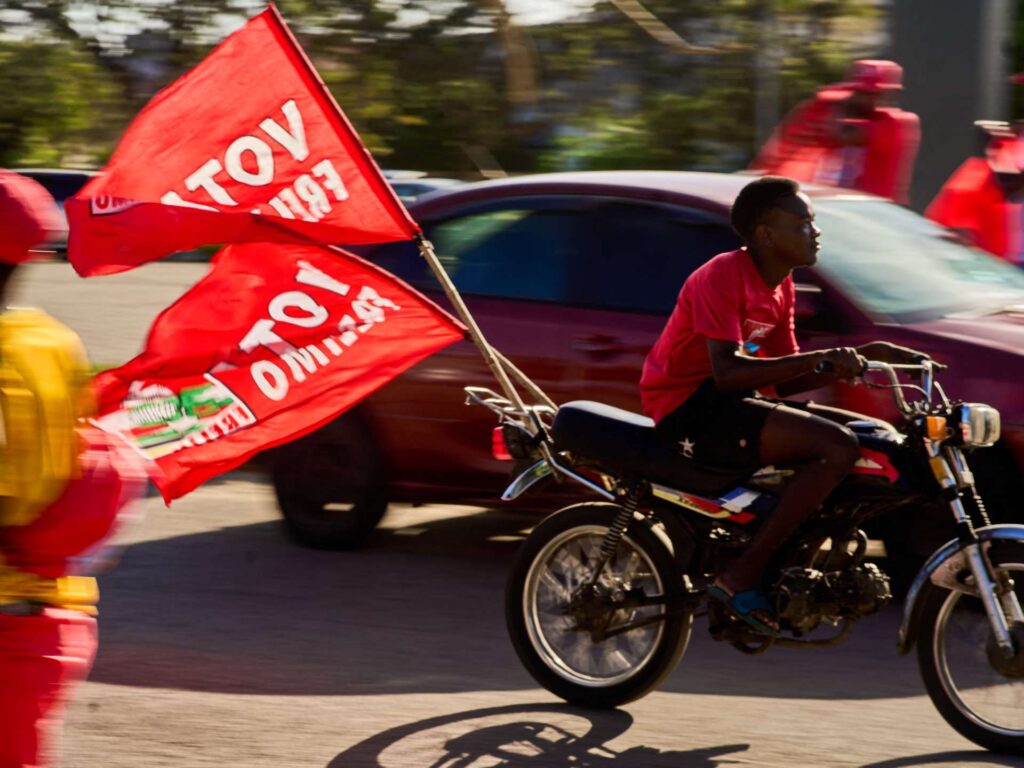
Podemos party’s lawyer Elvino Dias and party representative Paulo Guambe killed before protests against the disputed vote. Gunmen in Mozambique have killed a leading opposition politician’s lawyer and another opposition official, according to their party, before protests against a disputed election result. The attackers chased the car of Podemos party’s lawyer Elvino Dias and party representative Paulo Guambe and fatally shot them late on Friday night in the capital Maputo, the party said on Saturday. Videos on social media showed a BMW SUV in the middle of the road with numerous bullet holes in the bodywork. Some of the videos showed what appeared to be the bodies of two men, one with blood on his chest, in the front seats. The other body was slumped over. The killings came with tensions already high in the southern African country as it waits for the results of an October 9 election that has drawn more allegations of vote-rigging and clamping down on dissent against the 49-year rule of the Front for the Liberation of Mozambique (Frelimo) party. Podemos has rejected provisional results showing a win for Frelimo and called for a nationwide strike on Monday. Although Venancio Mondlane ran for president as an independent, he was supported by Podemos. The killings are “further clear evidence of the lack of justice that we are all subjected to”, Podemos stated. “They were brutally assassinated [in a] cold-blooded murder,” Adriano Nuvunga, director of Mozambique’s Center for Democracy and Human Rights (CDD), told the Reuters news agency by telephone. “The indication [is] that around 10 to 15 bullets were shot, and they died instantly.” Human Rights Watch also issued a statement confirming the attack. According to the latest election tally, Frelimo is leading in all 11 provinces and its candidate Daniel Chapo is widely expected to win the election. Chapo is expected to be announced as successor to President Filipe Nyusi, who has served a maximum of two terms. Podemos and other opposition parties have accused Frelimo of electoral fraud. Western observers have also cast doubt on the polls, citing reports of vote-buying, intimidation, and inflated voter rolls in Frelimo strongholds. Mozambique has struggled with these issues since Frelimo first introduced democracy in 1994 after two decades in power. The election’s final results are expected on October 24, but there are fears Monday’s protest could be violent. Mozambique’s security forces have opened fire on political protesters in the past, including after last year’s local elections, according to rights groups. Nuvunga, the NGO director, wrote on social media that the killing of Dias was a “political assassination”. Adblock test (Why?)
Is Sudan’s army regaining ground lost in the civil war?

The war in Sudan is entering a new phase as the Sudanese army and its rival, the paramilitary Rapid Support Forces (RSF) fight over the capital, Khartoum, and the last contested state in the sprawling western region of Darfur. The RSF has controlled most of Khartoum ever since the war erupted in April 2023. Here’s what we know about the situation today: What was life in Khartoum like under the RSF? The armed group, headed by Mohamed Hamdan “Hemedti” Dagalo, has looted and confiscated homes and warehouses across the capital. Whoever could flee Khartoum, has, but many others had to stay under the mercy of the RSF, which has subjected women to sexual violence and randomly rounded up and detained men for days or months. Those who lived under RSF rule say the paramilitary often killed families for refusing to hand over their daughters or mothers, as well as their homes and belongings. Has the army retaken Khartoum? On September 26, the army, which has also been criticised for human rights abuses and failure to protect civilians from the RSF, launched a sweeping offensive to retake the city. As warplanes and troops descended on Khartoum, the army finally recaptured some territory in the capital, according to local sources and reporters on the ground. The army has reportedly captured three bridges, including Halfaya, which allowed it to break an RSF siege on its military facilities in Kadroo, a nearby neighbourhood. Sudanese fighters from the Rapid Support Forces secure an area in East Nile province, Sudan, on June 22, 2019 [Hussein Malla/AP Photo] How are people reacting to the army’s advance? Most people are welcoming the army as liberators, relieved to have a semblance of stability return to their neighbourhoods. Yet despite the jubilation, the army is reportedly committing summary executions as it retakes territory – targeting people it perceives as affiliated with the RSF, according to analysts, the United Nations and local monitors. “These [executions] are definitely verified,” according to Hamid Khalafallah, a Sudan expert and PhD candidate at the University of Manchester. Al Jazeera sent written questions to Sudanese Armed Forces spokesperson Nabil Abdullah asking him to comment on the accusations. No response had been received by time of publication. Can the army retake all of Khartoum? This may be its best shot, but the battle is far from over. The army is trying to take the capital in hopes of securing leverage for future peace talks, Suliman Baldo, executive director of the Sudan Transparency and Policy Tracker think-tank, said. “[A situation] where the army controls Khartoum would boost its morale and it may have them believe that they made enough military progress to go towards negotiations,” he told Al Jazeera. However, Khalafallah stressed, the army is still far from controlling the entire city, despite its recent advances. “It is not clear how far the army is able to advance but they are putting up a big fight,” he said. Plumes of smoke rise during clashes between the paramilitary Rapid Support Forces and the army in Khartoum, Sudan, on September 26, 2024 [Stringer/Reuters] What about Darfur? The RSF is also fighting the army and its allied armed groups in el-Fasher, the capital of North Darfur. While the paramilitary controls four out of five Darfur states – East, West, Central and South – it has struggled to conquer North Darfur, which has put up fierce resistance. As fighting intensifies, the UN estimates that some 700,000 internally displaced people are at severe risk of being harmed in North Darfur, either from armed attacks or famine. The RSF has maintained a five-month siege on el-Fasher, which has wrought devastating suffering on civilians, according to aid groups. The aid groups added that about 2.8 million people live in and around el-Fasher, but have no means to escape. What’s more, they noted that boys were joining armed groups to earn a meagre salary, while families were marrying off young girls to have fewer mouths to feed. An internally displaced woman carries aid in sacks at a camp in Gadarif on May 12, 2024 [AFP] What’s next? The battle for Khartoum may determine the direction of the war in Sudan, according to experts. Baldo said he believes the army is trying to recapture Khartoum, as well as other major cities in north and central Sudan so it can then shift the focus of the conflict to Darfur. That’s where the RSF enjoys support from its “Arab” tribal base – a name that refers to pastoralist communities as opposed to sedentary farming communities that are often referred to as “non-Arabs”. Baldo added that the army would then try to destablise its foe. “I think the army may push for infighting [within the RSF] in Darfur,” he told Al Jazeera. Adblock test (Why?)
How Israel is trying to generate civil strife in Lebanon
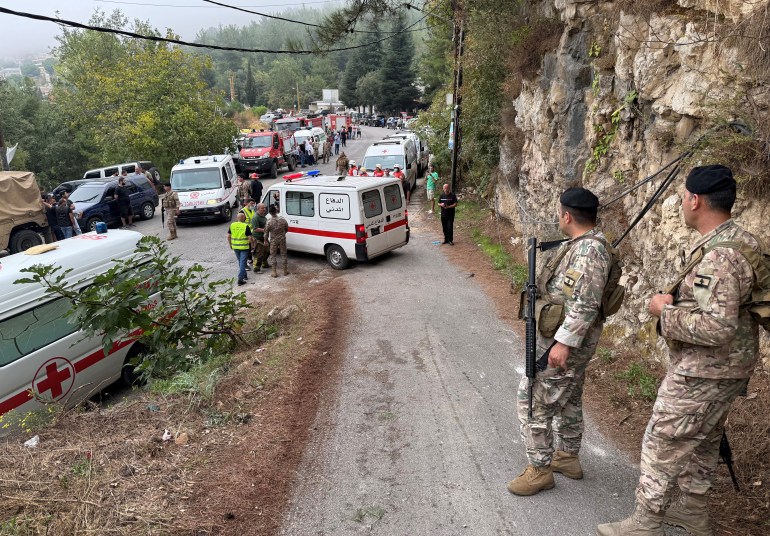
Beirut, Lebanon – On October 14, Israel killed 22 people in the northern Lebanese village of Aitou in an air attack. Israel claimed it struck a “Hezbollah target” but the attack on a predominantly Christian town has made many wonder if Israel is expanding its war to chase down Hezbollah members and mainly Shia Hezbollah supporters wherever they may have fled to. “I can only guess Israel’s motives, but obviously they are trying to make the Shia community toxic by trying to isolate them completely,” said Michael Young, a Lebanon expert for Carnegie Middle East Center. Fragile system Lebanon runs a confessional system, with political posts reserved for members of specific religious sects. The fragile system has been historically exploited by regional states for their own geopolitical goals, by dividing the country’s political factions and religious communities. In addition, each religious community typically lives in relatively segregated areas and neighbourhoods in Lebanon – largely an outcome of previous violent conflicts that degenerated into sectarian violence and led to the mass displacement of communities. The attack on Aitou harks back to Lebanon’s 15-year civil war (1975-1990) when the country got dragged into the broader Israeli-Palestinian conflict and descended into multi-faceted fighting. Now, Israel’s war – ostensibly against Hezbollah – is threatening to destabilise the entire country again as a pattern emerges, beyond the Aitou attack, where Israel attacks neighbourhoods and communities that have absorbed thousands of displaced people. Analysts believe this trend reflects a sinister motive of collectively punishing Hezbollah’s Shia support base, psychologically tormenting the Lebanese populace and triggering sectarian violence. “When [Israel] is hitting [these people] in areas that are largely not Hezbollah-controlled, then more and more people from these areas will be reluctant to receive displaced Shia because they fear Israel will attack them,” Young told Al Jazeera. Lebanese army soldiers stand guard near a site of an Israeli air raid in the Christian-majority region of Aitou in north Lebanon, October 14, 2024. REUTERS/Omar Ibrahim (Reuters) Psychological warfare? The terrifying prospect that Israel could continue flattening districts across Lebanon is a clear form of psychological warfare, according to Maha Yahiya, an expert on Lebanon and the director of Carnegie Middle East Center. “This is a message to Hezbollah and to the broader [Shia] community that says: ‘We will get you wherever you are,’” Yahiya said. “On the flip side, it is aggravating sectarian tensions and triggering almost panic among the broader Lebanese populace, who are terrified of having neighbours they don’t know and who Israel may decide to target.” According to Ori Goldberg, an Israeli commentator on political affairs, Israel appears to be applying the same open-ended discourse and military tactics in Lebanon as it has done in Gaza. “Israel feels like it can target anything it regards as a military position, irrespective of who may be there, just like in Gaza. Just like what we saw in Nabatieh,” he told Al Jazeera. Nabatieh is a provincial capital in south Lebanon that Israel has indiscriminately carpet-bombed, effectively reducing it to wasteland. On October 16, an Israeli airstrike hit Nabatiyeh’s municipal headquarters, killing 16 people including the mayor. It was the largest attack on a state building since Israel first escalated its bombing campaign against Hezbollah on September 22. “[Israel thinks] that if people are near where we’re bombing, we don’t care. That’s their problem,” Goldberg told Al Jazeera. Aggravating sectarian tensions Karim Emilie Bitar, a professor of international relations at the Saint Joseph University of Beirut, believes that the areas Israel is hitting outside of south Lebanon do not have any military or strategic importance. “There seems to be an intention to foster civil strife in Lebanon,” he told Al Jazeera. “The way we can read these attacks is… that it is a message sent to Christians in particular to be careful and do not welcome these [Shia] refugees. “If [Israel] continues along this path, then it could lead to a deepening of the fault lines in Lebanon. People will become increasingly cautious, and it could sooner or later provoke serious incidents and civil strife.” In many predominantly Christian quarters of Beirut, residents and sectarian factions have begun monitoring guests and visitors in their neighbourhood, often doing background checks. In many cases, displaced people have been prohibited from moving into buildings or evicted from areas they recently moved into, according to Yahiya from the Carnegie Center. She added that people in various communities are increasingly “terrified” of having neighbours they do not know and who may be targeted by Israel. “[Israel’s tactics] have created a politics of fear,” she told Al Jazeera. “And it is stoking sectarian fire by trying to basically make other communities reject the displaced wherever they are.” epa11660666 Displaced people sit on a street in Beirut, Lebanon, 15 October 2024. The International Organization for Migration (IOM) has recorded over 600,000 internally displaced people (IDPs) in Lebanon since the start of hostilities between Israel and Hezbollah. EPA-EFE/WAEL HAMZEH (EPA) Grand strategy? Israel’s Prime Minister Benjamin Netanyahu made his intentions known during his televised address to the Lebanese people on October 8, warning that they could face “destruction like Gaza” unless they acted now to “save Lebanon” from Hezbollah. His remarks indicated that Israel aims to reshape the politics of Lebanon, belying his earlier claims that Israel would launch a limited operation in south Lebanon to allow thousands of displaced Israelis to return to their homes in north Israel across the border. Goldberg, the commentator from Israel, believes it does not have realistic political objectives in the country. “What’s worrying is I don’t think there is an end game. Officially, [Israel] wants to establish a 10-km [6.2-mile] buffer, with 7km [4.3 miles] being held by the Lebanese Armed Forces and 3km [1.9 miles] by the Israeli army, but I don’t think that’s credible,” he told Al Jazeera. Worse yet, Goldberg believes Israel’s government is quite comfortable maintaining an indefinite war on Lebanon, just as it is doing in Gaza. “Israel wants to bomb,” he said.
Jharkhand Assembly Election 2024: BJP releases first list of 66 candidates, fields Champai Soren from…
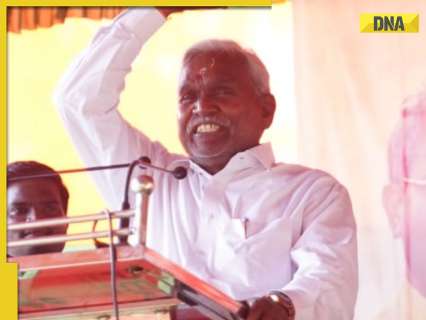
Former Jharkhand CM Champai Soren set to contest from Saraikella.
Swing state official warns village struggling with financial losses after influx of illegal immigrants
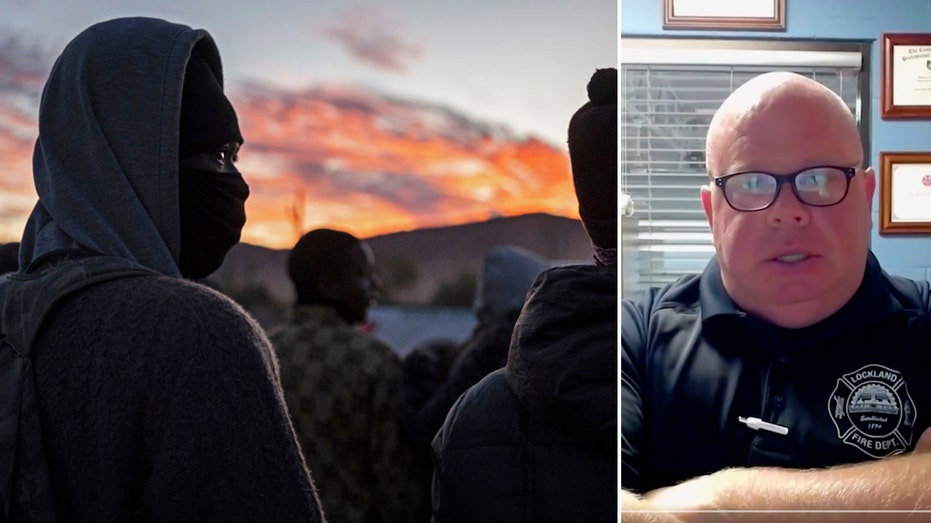
A small village near Cincinnati, Ohio, is struggling with an influx of Mauritanian illegal immigrants, with officials warning that they are facing an economic shortfall as a result and that the quality of life is being affected. “If you look at 2021, 2022, the United States had seen a huge influx of immigrants from Mauritania. Somehow, a good number of them have landed in Lockland,” Lockland Village Administrator Dough Wehmeyer told Fox News Digital. A Washington Post analysis in June found that over 15,000 residents from Mauritania came to the U.S. last year, a 2,800% increase over 2022, when just 543 arrived. Lockland, a village in the southwest of Ohio of about 3,500 people, has seen what it says is a large number of arrivals. The Post reported that there were 2,700 who settled in Ohio in 2023, with about half going to nearby Cincinatti. HAITIAN MIGRATION ROILS TOWN IN KEY BATTLEGROUND STATE WITH SIGNS OF PRO-TRUMP SUPPORT ON THE RISE Wehmeyer said that at least two of the nearby apartment complexes are over-occupied. Apartments should house four people apiece, and authorities are finding up to 12 people in each unit. “You have an apartment building that’s . . . say, 80 units at four people per unit. That’s about 320 people. When you double or maybe even triple that population, the building systems aren’t designed to handle that.” “So when you use the utilities, that’s backing up. We have instances where people are going in to take a shower and feces is running out of the drains, filling the bathtubs as it comes from a floor above. That’s compounded probably by the cooking methods that they use, which is a heavy grease-laden process.” He also noted that a building designed to have 320 people in it, but that may have significantly more, also comes with the risk of not having enough exits, and he said there have been issues with people getting out of buildings during fires. TRUMP SOUNDS ALARM ON ILLEGAL IMMIGRANT MURDERERS: ‘A LOT OF BAD GENES IN OUR COUNTRY’ He also noted the financial strain it has put on the small community. Illegal immigrants claiming asylum may not work right away, and it can be months before they are qualified for work permits if they claim asylum. “So, most of the immigrants living in Lockland are unable to work. And if they are unable to work, they’re unable to pay taxes,” he said. “And they have essentially displaced the taxpaying residents of these 200 apartment units and filled them with non-tax-paying residents. We’re losing about $125,000 to 150,000 in revenue because of that.” He says the village has requested help from congressional offices, and has met with a few, as well as state representatives and the governor’s office. He says that Lockland is looking for financial assistance to recoup the financial losses the village is facing, but believes progress is being made. “I don’t know how they found our small village. We like it. We think it’s a great place to live, but the quality of life here is definitely being affected by this problem,” he said. Lockland’s struggles echo those in other towns and cities across the country where there have been a significant influx of migrants. Towns like Springfield, Ohio, and Charleroi, Pennsylvania, have seen a significant increase in the number of migrants from Haiti. Meanwhile, cities like Chicago and New York have been vocal in the strain that influxes of hundreds of thousands of migrants from across the border have had on their cities. Meanwhile, immigration has become a top issue for voters ahead of the 2024 election, with many polls showing former President Donald Trump with a strong lead over Vice President Kamala Harris on handling the issue.
Meet Vijaya Kishore Rahatkar, the newly appointed chairperson of NCW

Rahatkar served as the Chairperson of the Maharashtra State Commission for Women from 2016 to 2021 and as the Mayor of Chatrapati Sambhajinagar from 2007 to 2010.
Who is IPS Anurag Gupta, acting Jharkhand DGP removed by EC ahead of Assembly polls?

During the 2019 Lok Sabha polls, IPS Gupta was relieved of his duties as ADG (Special Branch), Jharkhand, following allegations of biased conduct made by the Jharkhand Mukti Morcha (JMM).
VP Harris to campaign with anti-Trump Republican Liz Cheney in key battleground states
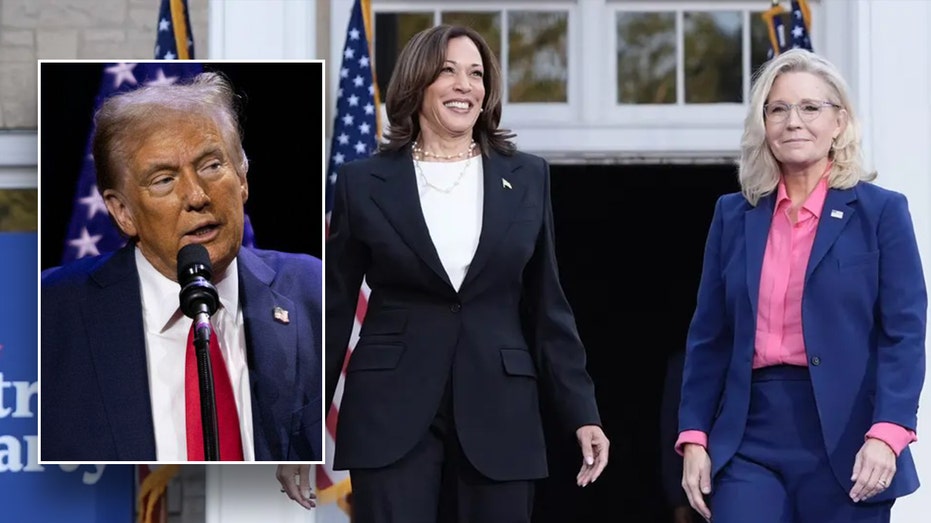
Vice President Harris will campaign in several “blue wall” suburban battleground states next week when she will be joined by former Republican Rep. Liz Cheney, a one-time rising conservative star in the GOP who, in the wake of the Jan. 6, 2021, riot on the U.S. Capitol, has vowed to do everything she can to prevent Trump from returning to power. Harris and Cheney will team up for a series of “moderated conversations” targeting suburban voters in Michigan, Pennsylvania and Wisconsin, according to several reports citing the Harris campaign team. The events will be moderated by longtime Republican strategist Sarah Longwell, publisher of The Bulwark, and conservative radio host and writer Charlie Sykes, per The Hill. Harris and Cheney will speak to voters in Chester County, Philadelphia, and Oakland County, Detroit, as well as Waukesha County, Milwaukee. The latter will take place the day before early in-person voting begins in the Badger State. HARRIS TEAMS UP WITH TOP ANTI-TRUMP REPUBLICAN AHEAD OF BRET BAIER FOX NEWS INTERVIEW The Harris campaign is seeking to appeal to disaffected Republican voters who are skeptical of supporting former President Trump in November. The news comes just weeks after Cheney stumped for Harris in Ripon, Wisconsin, with the former Republican congresswoman becoming the Democratic nominee’s most prominent conservative surrogate. Cheney, the daughter of former Republican Vice President Dick Cheney, once rose within the ranks of House Republican leadership. But she was the most high-profile of the 10 House Republicans who voted to impeach then-President Trump in early 2021 on a charge of inciting the deadly January 6th riot at the Capitol, which was waged by some Trump supporters who aimed to disrupt congressional certification of President Biden’s Electoral College victory in the 2020 election. TRUMP UPS HIS ANTE IN THE 2024 FUNDRAISING FIGHT WITH HARRIS The conservative lawmaker and defense hawk immediately came under verbal attack from Trump and his allies and was eventually ousted from her No. 3 House GOP leadership position. Cheney, who has been vocal in emphasizing the importance of defending the nation’s democratic process and of putting country before party, was one of only two Republicans who served on a special select committee organized by House Democrats that investigated the riot at the Capitol. In 2022, she lost the GOP congressional primary in Wyoming to Harriet Hageman, a candidate backed by Trump. At a speaking event in early September at Duke University in swing state North Carolina, Cheney announced that she would vote for Harris in the presidential election. Cheney’s father also endorsed Harris. Cheney earlier this month warned that “our republic faces a threat unlike any we have faced before: a former president who attempted to stay in power by unraveling the foundations of our republic.” She argued that Trump “can never be trusted with power again” and emphasized that “in this election, putting patriotism ahead of partisanship is not an aspiration, it is our duty.” “What January 6 shows us is there is not an ounce, not an ounce, of compassion in Donald Trump. He is petty. He is vindictive. He is cruel. And Donald Trump is not fit to lead this good and great nation,” Cheney said. Harris is also backed by more than 200 alumni who served in both Bush administrations or worked for the late Sen. John McCain and Sen. Mitt Romney, the 2008 and 2012 GOP presidential nominees, respectively. She is also supported by more than 100 Republican former national security officials and other prominent Republicans. The Trump campaign has fired back at Republican support of Harris. “It’s quite pathetic to see former ‘Republicans’ of the past dug up out of irrelevance to have one last moment in the sun by campaigning for another four years of unlimited illegal immigration, rising prices, and endless wars under Kamala Harris,” Trump campaign Pennsylvania spokesman Kush Desai told Fox News. “Fortunately, as with any other theatrical prop, they’re all going to be tossed aside the moment they stop being useful for Democrats — which will be November 5th, when President Trump is re-elected by Pennsylvanians.”
Hovde shines spotlight on Tammy Baldwin’s Wall Street partner during Wisconsin debate
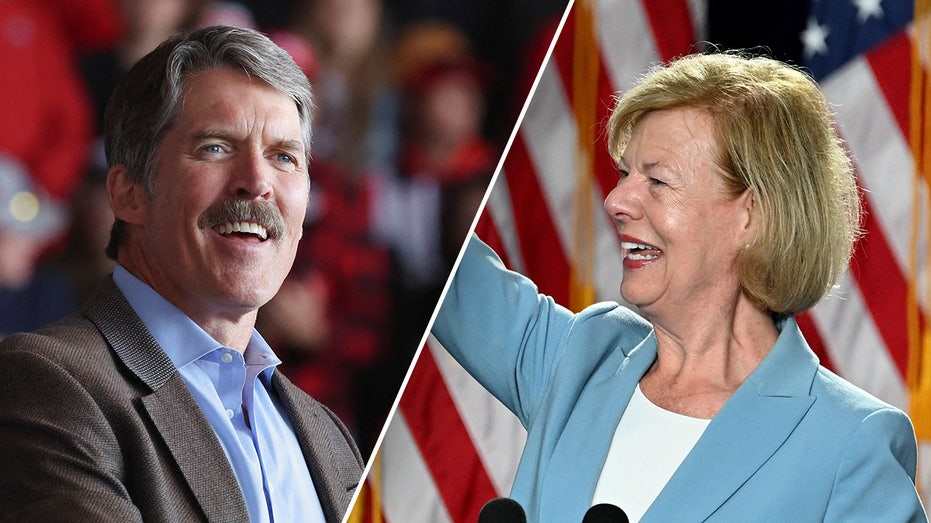
The Republican candidate in Wisconsin, businessman Eric Hovde, took several opportunities during the only Senate debate between himself and Sen. Tammy Baldwin, D-Wis., on Friday night to call her out for refusing to disclose her partner’s finances, calling it a conflict of interest. “Her partner on Wall Street, a Wall Street executive, is investing in Big Tech and Big Pharma,” he claimed. Baldwin’s longtime partner, Maria Brisbane, is a private wealth adviser under Morgan Stanley and caters to clients with “ultra-high net worth,” per the Brisbane group’s website. JUDGE ORDERS MORE JACK SMITH TRUMP INVESTIGATION DOCS TO BE MADE PUBLIC AHEAD OF ELECTION However, Brisbane’s clients are unknown due to confidentiality outlined in Morgan Stanley’s code of conduct, as well as the fact that she and Baldwin are not married. Brisbane and Baldwin have dated since 2018 and share a home in Washington, D.C. Senators are not required to disclose the finances of partners, only spouses. During questions on healthcare policy, childcare policy and ethics, Hovde brought attention to Baldwin’s “Wall Street partner.” HARD-LINE GOP EFFORT TO DECENTRALIZE SENATE LEADER AUTHORITY DASHED BY MCCONNELL ALLY “I’m not taking special interest money like Senator Baldwin,” he said. “In fact, her partner is making money off of it. And doesn’t even disclose the profit she’s making.” While the investments Brisbane is making are unknown, her previous roles have involved work with biotechnology companies and funds. Baldwin’s partner was previously manager of a biotechnology mutual fund, according to a progress report from 2017 for the Cancer Research & Treatment Fund (CR&T). ‘DESPICABLE HUMAN BEING’: MCCONNELL’S 2020 THOUGHTS ON ‘SLEAZEBALL’ TRUMP REVEALED IN NEW BOOK Additionally, Brisbane listed on her firm’s previous archived website under Merrill Private Wealth Management that she “manages custom-tailored equity portfolios that place emphasis on large-growth stocks – with an effort to enhance performance through small biotechnology and technology companies.” Hovde specifically pointed to Baldwin’s committee roles that he said were potentially at odds with her partner’s work on behalf of wealthy clients. Baldwin is on the Senate Committee on Appropriations, the Senate Committee on Commerce, Science, and Transportation, and the Senate Committee on Health, Education, Labor, and Pensions. “They don’t disclose those investments and how much they’re profiting from it,” Hovde said of Baldwin and Brisbane. “That’s fundamentally wrong. And you should disclose what investments your partner is making.” HARRIS BARNSTORMS WISCONSIN IN 1-DAY SWING STATE TOUR TARGETING YOUNG VOTERS The senator was not compelled by her opponent’s argument to disclose Brisbane’s finances, telling him he “should stay out of my personal life.” At another point, Baldwin criticized Hovde for targeting her partner and said she was interested instead in his “professional life.” In attendance at the swing state debate was Senate Republican conference Chairman John Barrasso, R-Wyo., who stumped on behalf of Hovde. He claimed Baldwin was “rattled,” and his Democrat colleague “would have been much happier in Manhattan with Maria tonight than here in Madison, Wisconsin.” In less than three weeks, the two will face off in a tight Wisconsin Senate race, which is considered a “toss up” by top political handicapper the Cook Political Report. Get the latest updates from the 2024 campaign trail, exclusive interviews and more at our Fox News Digital election hub
Jharkhand elections 2024: Hemant Soren’s JMM, Congress to contest 70 of 81 seats

Notably, seat-sharing talks are on with alliance partners – the RJD and the Left parties – for the remaining 11 seats
